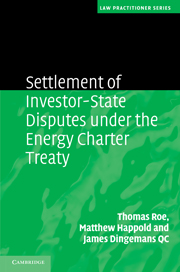Book contents
- Frontmatter
- Contents
- Foreword
- Preface
- Table of cases
- 1 Introduction
- 2 The applicable law
- 3 Availability of dispute settlement under Article 26
- 4 European Union law and the Energy Charter Treaty
- 5 Substantive law
- 6 Procedure
- 7 Contracting Parties' international responsibility for breaches of Part III of the ECT
- 8 Taxation
- Appendix A Selected provisions of the Energy Charter Treaty
- Appendix B Signatories to the Energy Charter Treaty
- Bibliography
- Index
2 - The applicable law
Published online by Cambridge University Press: 05 July 2011
- Frontmatter
- Contents
- Foreword
- Preface
- Table of cases
- 1 Introduction
- 2 The applicable law
- 3 Availability of dispute settlement under Article 26
- 4 European Union law and the Energy Charter Treaty
- 5 Substantive law
- 6 Procedure
- 7 Contracting Parties' international responsibility for breaches of Part III of the ECT
- 8 Taxation
- Appendix A Selected provisions of the Energy Charter Treaty
- Appendix B Signatories to the Energy Charter Treaty
- Bibliography
- Index
Summary
Introduction
Article 26 of the ECT sets out the rules governing the settlement of disputes between investors and Contracting Parties concerning alleged breaches by the latter of their obligations under Part III of the ECT. The law governing such disputes is provided for in Article 26(6):
A tribunal established under paragraph (4) shall decide the issues in dispute in accordance with this Treaty and applicable rules and principles of international law.
Article 26(4) provides for the submission of disputes to international arbitration: either to ICSID (under the ICSID Convention or the Additional Facility Rules), the Arbitration Institute of the Stockholm Chamber of Commerce, or ad hoc arbitration under the UNCITRAL Arbitration Rules. In all cases, the relevant arbitration rules also provide that the tribunal shall decide the dispute in accordance with the rules of law designated by the parties. It is consequently clear that an arbitral tribunal deciding a dispute under Article 26 of the ECT must apply not only the Treaty itself but also any applicable rules of international law. This is not to say that the national law of the respondent state or, indeed, of the claimant's state of nationality, is irrelevant, simply that issues of that law are to be approached as matters of fact, the consequences and characterisation of which are determined by the application of international law.
Interpreting the Energy Charter Treaty
The ECT is a treaty, an agreement concluded between states in written form governed by international law.
- Type
- Chapter
- Information
- Publisher: Cambridge University PressPrint publication year: 2011



